- Home
- Elif Shafak
Three Daughters of Eve Page 2
Three Daughters of Eve Read online
Page 2
There were two men in the car beside them. Both grinned at her. Remembering that the Advanced Learner’s Guide to Patriarchy defined the act of a woman blowing smoke into the face of an unfamiliar male as an open sexual invitation, Peri paled. Though easy to forget at times, the city was a stormy sea swollen with drifting icebergs of masculinity, and it was better to manoeuvre away from them, gingerly and smartly, for one never knew how much danger lay beneath the surface.
Whether driving or walking, a woman did best to keep her gaze unfocused and turned inward, as if peering into distant memories. When and wherever possible, she should lower her head to convey an unambiguous message of modesty, which was not easy, since the perils of urban life, not to mention unsolicited male attention and sexual harassment, required one to be vigilant at all times. How women could be expected to keep their heads down and simultaneously have their eyes open in all directions was beyond Peri. She threw away the cigarette and closed the window, hoping the two strangers would soon lose interest in her. The traffic light changed from red to green, but it didn’t matter. Nothing was moving.
That was when she noticed a tramp walking down the middle of the road. Tall and gangly with an angular face, he was thin as a whisper, his forehead creased beyond his years, his chin covered in a rash and his hands in weeping patches of eczema. One of the millions of Syrian refugees who had fled the only life they knew, she first thought – though there was an equal chance that he was a local Turk or a Kurd or a Gypsy or a bit of everything. How many people in this land of endless migrations and transformations could say with certitude that they were of one pure ethnicity, unless they were lying to themselves – and to their children? But, then again, Istanbul amassed deceptions galore.
The man’s feet were caked with dried mud, and he wore a ragged coat with the collar turned up, so dirty that it was almost black. Having found her lipstick-smudged cigarette, he was smoking it nonchalantly. Peri’s gaze travelled from his mouth to his eyes, surprised to see that he had been watching her with an amused expression. There was a swagger in his manner, a challenge almost; he seemed not so much a tramp as an actor playing the part of a tramp and, confident of his performance, he was waiting for applause.
Having now three men to avoid, the two in the car plus the tramp, Peri turned aside brusquely, forgetting that there was a coffee cup there. The frappuccino tipped over, sending its frothy contents into her lap.
‘Argh, no!’ Peri shrieked as she gaped in horror at the dark stain spreading on her expensive dress.
Her daughter whistled, clearly enjoying the disaster. ‘You can say it’s a piece by a new crazy designer.’
Ignoring the remark and cursing herself, Peri blindly grabbed her handbag – a lavender ostrich Birkin, perfect in every detail other than the misplaced accent on the word ‘Hermès’, for there was nothing the city’s bootleggers couldn’t counterfeit except proper spelling – which she had tucked between her legs. She took out a packet of tissues, even though she knew, or a part of her knew, that wiping would only worsen the stain. In her distraction, she made a mistake no veteran driver in Istanbul ever would: she tossed her handbag into the back seat – and the doors unlocked.
She could see something fluttering out of the corner of her eye. A beggar girl, no older than twelve, was coming towards them, pleading for coins. Her clothes flapping about her skinny frame, her palm extended forward, she walked without moving her body from the waist up, as if through water. She stayed in front of each car for about ten seconds before proceeding to the next. Perhaps, Peri thought, she had figured out that if one could not inspire mercy in that brief amount of time, one would never do so. Compassion never came as an afterthought: it was either spontaneous or absent entirely.
When the girl reached the Range Rover, both Peri and Deniz automatically glanced in the opposite direction, pretending not to have seen her. But the beggars of Istanbul were used to being invisible to others and came well prepared. Exactly in the spot where mother and daughter had turned their heads stood another child of around the same age, waiting with an open palm.
To Peri’s immense relief the light turned green and the traffic shot forward like water out of a garden hose. She was about to put her foot on the accelerator when she heard the back door open and close, as fast as a switchblade. In the mirror she saw her handbag being scooped out of the car.
‘Thieves!’ Her voice hoarse from the effort, Peri screamed. ‘Help, they stole my bag. Thieves!’
The cars behind her honked frantically, oblivious to what had happened, eager to go. It was obvious nobody was going to help. Peri hesitated, but only for a moment. With a dexterous spin of the steering wheel, she swerved the car to the kerb and left her emergency lights flashing.
‘Mum, what are you doing?’
Peri didn’t respond. There was no time. She had seen the direction in which the children had scampered off, and she needed to follow them at once; something inside, an animal instinct for all she knew, assured her that if she could find them she would get back what rightly belonged to her.
‘Mum, let it go. It’s just a bag – and fake!’
‘I’ve got money and credit cards in there. And my phone!’
But her daughter was worried, embarrassed even. Deniz did not like to attract attention, only wanted to blend in, a drop of grey in a sea of grey. All her rebelliousness seemed to be saved for her mother.
‘Stay here, lock the doors, wait for me,’ Peri said. ‘For once, do as I say. Please!’
‘But, Mum …’
Without thinking, not thinking at all, Peri dashed out of the car, forgetting for an instant that she was wearing high heels. She took off her shoes, her bare feet hitting the asphalt heavily. From inside the car, her daughter gaped at her, eyes wide with astonishment and mortification.
Peri ran. In her purple dress, carrying the weight of her years, her cheeks aflame, the wife-housewife-mother-of-three, in front of dozens of eyes, was painfully aware that her breasts were hopping frantically and she was unable to do anything about it. Even so, tasting a strange sense of freedom, trespassing in a forbidden zone she could not name, she sprinted across the road towards the inner streets, while drivers laughed and seagulls swirled above her head. If she hesitated, if she so much as slowed for a second, she would have been horrified at what she was doing. The possibility of stepping on rusty nails, broken beer bottles or rat urine would have terrified her. Instead she charged ahead. Her legs, almost independently, as if with a memory of their own, kept going faster and faster, remembering the time long ago at Oxford when she would jog three to four miles every day, rain or shine.
Peri used to love running. Like other joys in her life, that, too, was no more.
The Mute Poet
Istanbul, 1980s
When Peri was little, the Nalbantoğlus lived on Mute Poet Street, in a lower-middle-class neighbourhood on the Asian side of Istanbul. Amidst the decaying days, a mixture of scents – fried aubergine, ground coffee, freshly baked flatbread, simmering garlic – emanated from the open windows, so strong that it permeated everything, seeping into gutter drains and manhole covers; so sharp that the morning wind immediately changed its direction. But the locals did not complain. They never noticed the smell. It was outsiders alone who picked it up – although very few outsiders ever had reason to come to this area. Houses leaned higgeldy-piggeldy like headstones in an unkempt graveyard. A fog of boredom hovered over everything and only lifted momentarily when the shouts of children, cheating at a game, pierced the air.
Rumours abounded as to the origin of the street’s peculiar name. Some believed that a renowned Ottoman poet who had resided in the area, unhappy with the meagre baksheesh granted him after a poem he had sent to the palace, swore not to open his mouth again until he was suitably rewarded by the Sultan.
‘Surely the Master of the Lands of Caesar and Alexander the Great, the Ruler of Three Continents and Five Seas, the Shadow of God on Earth, would bestow his unbounded generos
ity on his humble subject. But if he doth not, I shall take it as a sign of the inferiority of my poems and I shall stay mute till the day I die, for a dead poet is preferable to a failed poet.’ Such were his last words before he fell as silent as midnight snow. It wasn’t pretension; he revered, feared and obeyed whatever in his mind he imagined a ruler to be. Still, being an artist he could not help but crave more attention, more praise, more love – and a few more coins would not be so bad either.
When the incident reached his ears, the Sultan, amused by such impudence, promised to make amends. Like all despots, he had mixed feelings about artists: while he disapproved of their unpredictability and unruliness, he also enjoyed their presence, provided they knew their limits. Artists had an unusual way of looking at things, which could be entertaining, except when it was not. He liked to keep a few of them in his court, under a tight rein. They were free to say whatever they pleased so long as they didn’t criticize the state and its rules, the religion and the Almighty, and, above all, the sovereign.
As fate would have it, that same week, following a plot in the seraglio to overthrow the Sultan and put his eldest son on the throne, the sovereign was murdered – strangled with a silk bowstring so as not to spill his noble blood. In death, as in life, the Ottomans liked to keep everyone in their places, everything meticulously regulated, unambiguous. While royals were strangled, thieves were hanged, rebels decapitated, highway robbers impaled, local dignitaries pounded in a mortar; concubines dropped into the sea in weighted sacks; every week a new set of severed heads was displayed on the gibbets in front of the palace, their mouths stuffed with cotton if they were high-ranking officers, with straw if they were nonentities. That was exactly how the poet felt. Bound by his oath, he remained silent till the day he breathed his last.
Others had a different version of the story. When the poet demanded to be compensated generously, the Sultan, angered at such effrontery, ordered his tongue to be cut out, chopped up, fried and fed to the cats of seven neighbourhoods. But, having uttered so many sharp words all these years, the poet’s tongue had an acrid taste, even after it was sautéed with sheep’s-tail fat and fresh onions. The cats all walked away. The poet’s wife, who had been watching the scene from behind a latticed window, secretly gathered up the pieces and sewed them together. She had barely placed her creation on the bed and gone to look for a surgeon who could put the tongue back in her husband’s mouth when a seagull swooped through the open window and stole it. Hardly surprising, given that the seagulls of Istanbul are notorious scavengers and feast on whatever comes their way, regardless of taste. A bird that can peck out and gobble up the eyes of animals twice its size can devour anything. Hence the poet remained as silent as a fisherman’s lamp. Instead a white avian, circling above his head, cawed the poems he could no longer recite to the entire city.
Whatever the truth behind its name, the street on which the Nalbantoğlus lived was a quaint, sleepy lane where the most cherished virtues were modelled on the three states of matter: to obey Allah – and the imams – with unswerving compliance, ultimate surrender and unbroken stability (solid); to accept the Divine River of Life no matter how much mud and debris it might sweep along (liquid); and to forgo ambitions since all possessions and trophies would eventually vanish into thin air (gas). Around here every destiny was seen as preordained, each suffering unavoidable, including those the residents of the street inflicted on each other, such as football fights, political brawls and wife-beating.
Theirs was a two-storey house, the colour of sour cherries. Throughout the years it had been painted several different hues: salted-plum green, walnut-jam brown, pickled-beet purple. The Nalbantoğlus rented the ground floor; their landlord lived upstairs. Although the family was not at all rich – all wealth is relative by the standards of time and place – Peri had grown up without feeling deprived. That would come later and, like all things deferred, it would arrive with such force that it seemed to be making up for lost time. She would learn to see the faults of the household in which she had once been so protected and beloved a daughter.
She was the Nalbantoğlus’ last child, her conception one big surprise, since her parents, having already raised two boys into their late teens, were deemed too old. Sheltered, cosseted, her every need not only satisfied but also anticipated, Peri led a life of acquired ease in these early years. Even so she was aware of a breeze of tension at home, which grew into a full-blown gale whenever her father and her mother happened to be in the same room.
They were as incompatible as tavern and mosque. The frowns that descended on their brows, the stiffness that infused their voices, identified them not as a couple in love, but as opponents in a game of chess. On the faded board of their marriage they each pushed forward, strategizing the next moves, capturing castles, elephants and viziers, aiming to deliver the ultimate defeat. Each side saw the other as the tyrant in the family, the intolerable one, and longed to say, someday, ‘Checkmate, shah manad, the sovereign is helpless.’ Their marriage had been so deeply woven with mutual resentment that they no longer needed a reason to feel wronged and frustrated. Even at that young age Peri sensed that love was not, and probably never had been, the reason why her parents were together.
In the evenings she watched her father slumped at the table with plates of mezes distributed around a bottle of raqi. Stuffed grape leaves, mashed chickpeas, grilled red peppers, artichokes in olive oil and his favourite, lamb’s brain salad. He would eat slowly, sampling each dish like a fastidious connoisseur, even though the food was no more than a necessity so as not to drink on an empty stomach. ‘I don’t gamble, I don’t steal, I don’t accept bribes, I don’t smoke and I don’t go around chasing women; surely Allah will spare His old creation this much misdeed,’ Mensur was fond of saying. Ordinarily, he would have a friend or two join him for these lengthy suppers. They would rattle on about politics and politicians, depressed about the state of things. Like the majority of the people in this land, they talked most about the things they liked least.
‘Travel the world, you’ll see, everyone drinks differently,’ Mensur would say. He himself had moved around a fair amount in his youth as a ship’s engineer. ‘In a democracy, when a man gets drunk, he cries, “What happened to my sweetheart?” Where there is no democracy, when a man gets drunk, he cries, “What happened to my sweet country?” ’
Soon words would melt into melodies and they would be singing – bouncy Balkan tunes at first, revolutionary Black Sea songs next, and gradually, inevitably, Anatolian ballads of heartbreak and unrequited love. Turkish, Kurdish, Greek, Armenian, Ladino lyrics would mix in the air, like coiling wisps of smoke.
Sitting by herself in a corner, a heaviness of heart would come over Peri. She often wondered what it was that made her father so sad. She imagined sorrow sticking to him like a fine layer of black tar under the sole of his shoe. She could neither find a way to lift his spirits nor stop trying, for she was, as everyone in the family would testify, her father’s daughter.
From the ornate picture frame on the wall, Atatürk – the father of the Turks – would glance down at them, his steel-blue eyes flecked with gold. There were portraits of the national hero everywhere; Atatürk in his military uniform in the kitchen, Atatürk in a redingote in the living room, Atatürk with a coat and kalpak in the master bedroom, Atatürk with silk gloves and flowing cape in the hall. On national holidays and commemorative days Mensur would hang a Turkish flag with a picture of the great man outside a window for everyone to see.
‘Remember, if it weren’t for him, we’d have been like Iran,’ Mensur often said to his daughter. ‘I’d have to grow a round beard and bootleg my own booze. They’d find out and flog me in the square. And you, my soul, would be wearing a chador, even at your young age!’
Mensur’s friends – schoolteachers, bank officers, engineers – were just as devoted to Atatürk and his principles. They read, recited and, when inspiration struck, wrote patriotic poems – many of which were so s
imilar in rhythm and repetitive in essence that, rather than separate pieces, they felt like echoes of the same call. Even so, Peri enjoyed lingering in the living room, listening to their amiable chatter, the tones and cadences of their voices, rising and falling with each new glass topped up to the brim. They did not mind her presence. If anything, her interest in their conversation seemed to rejuvenate them, filling them with hope for the youth. Thus Peri stayed around, sipping orange juice from her father’s favourite mug, which had the signature of Atatürk on one side and a quote from the national leader on the other: The civilized world is ahead of us; we have no choice but to catch up. Peri loved this porcelain cup, the smooth touch of it against her palm, though it made her slightly regretful each time she finished her drink, as though the chance of catching up with the civilized world had also disappeared.
Peri would be up and down like a yo-yo. Ice buckets to refill, ashtrays to empty, bread to toast; there was always some task to be done – especially since her mother absented herself on such evenings.
As soon as Selma placed the food on the table, quietly sighing to herself, she would retreat to her bedroom and not emerge until the next morning. Sometimes she wouldn’t reappear until midday or later. Depression was a word unheard of in the house. Headaches, she would explain. She often suffered from severe headaches that left her debilitated and in bed, her eyes almost closed, as if squinting against perpetual sunlight. When the body was weak, the mind was purified, she claimed – so pure that she saw omens in everything: a pigeon cooing outside her window, a bulb that suddenly burned out, a leaf swimming in her tea. Cloistered in her room, she would lie prostrate, listening and accounting for every single sound. It was impossible not to hear: the walls were as thin as sheets of rolled-out dough. But there was another wall between Selma and Mensur, erected decades earlier, rising higher with every passing year.

 Black Milk: On Writing, Motherhood, and the Harem Within
Black Milk: On Writing, Motherhood, and the Harem Within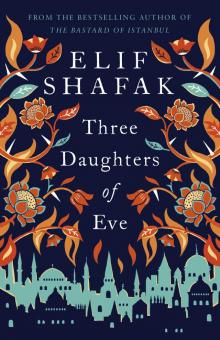 Three Daughters of Eve
Three Daughters of Eve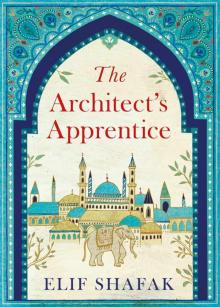 The Architect's Apprentice
The Architect's Apprentice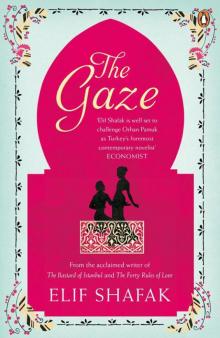 The Gaze
The Gaze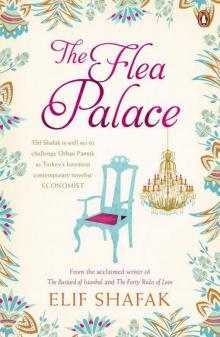 The Flea Palace
The Flea Palace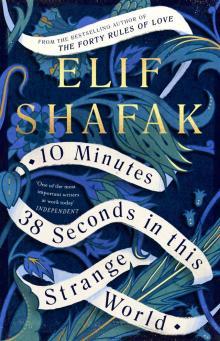 10 Minutes 38 Seconds in this Strange World
10 Minutes 38 Seconds in this Strange World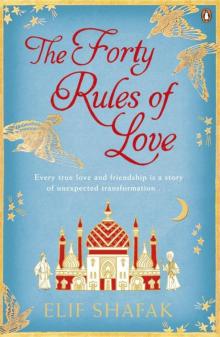 The Forty Rules of Love
The Forty Rules of Love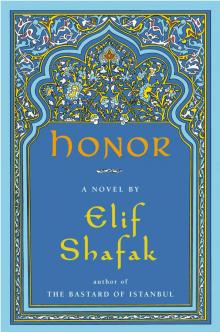 Honor
Honor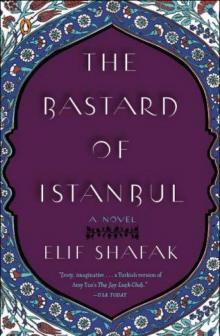 The Bastard of Istanbul
The Bastard of Istanbul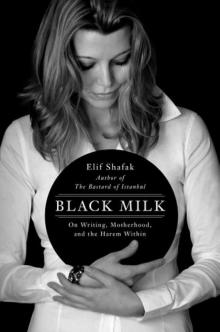 Black Milk
Black Milk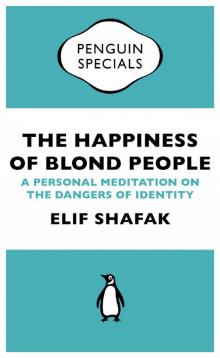 The Happiness of Blond People (Penguin Specials)
The Happiness of Blond People (Penguin Specials)